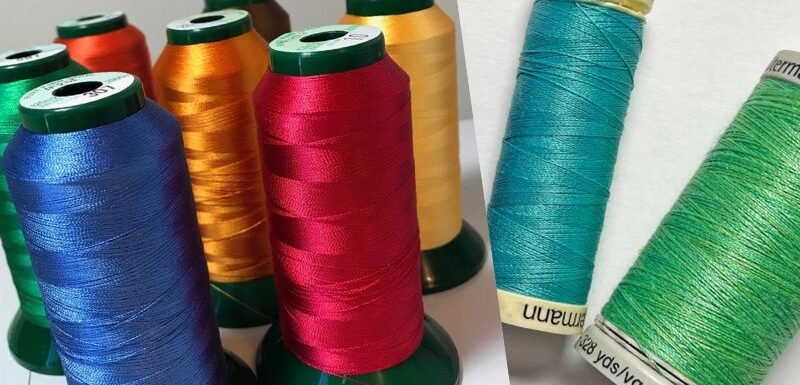Unlock the secrets of machine embroidery thread. Learn about thread weight, types, brands, and discover the best choices for your next embroidery project.
When you enter the world of machine embroidery, one of the first things you will encounter is the vast variety of machine embroidery threads available.
Whether you’re a beginner or a seasoned pro, understanding machine embroidery thread can significantly impact the quality of your embroidery work.
With so many different threads available, it’s easy to be overwhelmed by the choice. This article looks at thread weight, types, and the most respected brands, along with tips on using the different threads in your work.
How to Choose the Best Machine Embroidery Thread
Affiliate Disclosure: Some of the links on this site are affiliate links. This means I may receive a small commission (at no further expense to you) if you click through and make a purchase. ThreadSketchingInAction.com is a participant in the Amazon Services LLC Associates Program, an affiliate advertising program designed to provide a means for sites to earn commission fees by advertising and linking to Amazon.com.
What is Meant by Thread Weight?
Thread weight — or “gauge” — refers to the thickness of a thread.
The gauge is indicated by a number on the spool or packaging.
The higher the number, the finer the thread, meaning that, for example, 60-gauge thread is finer than 40-gauge.
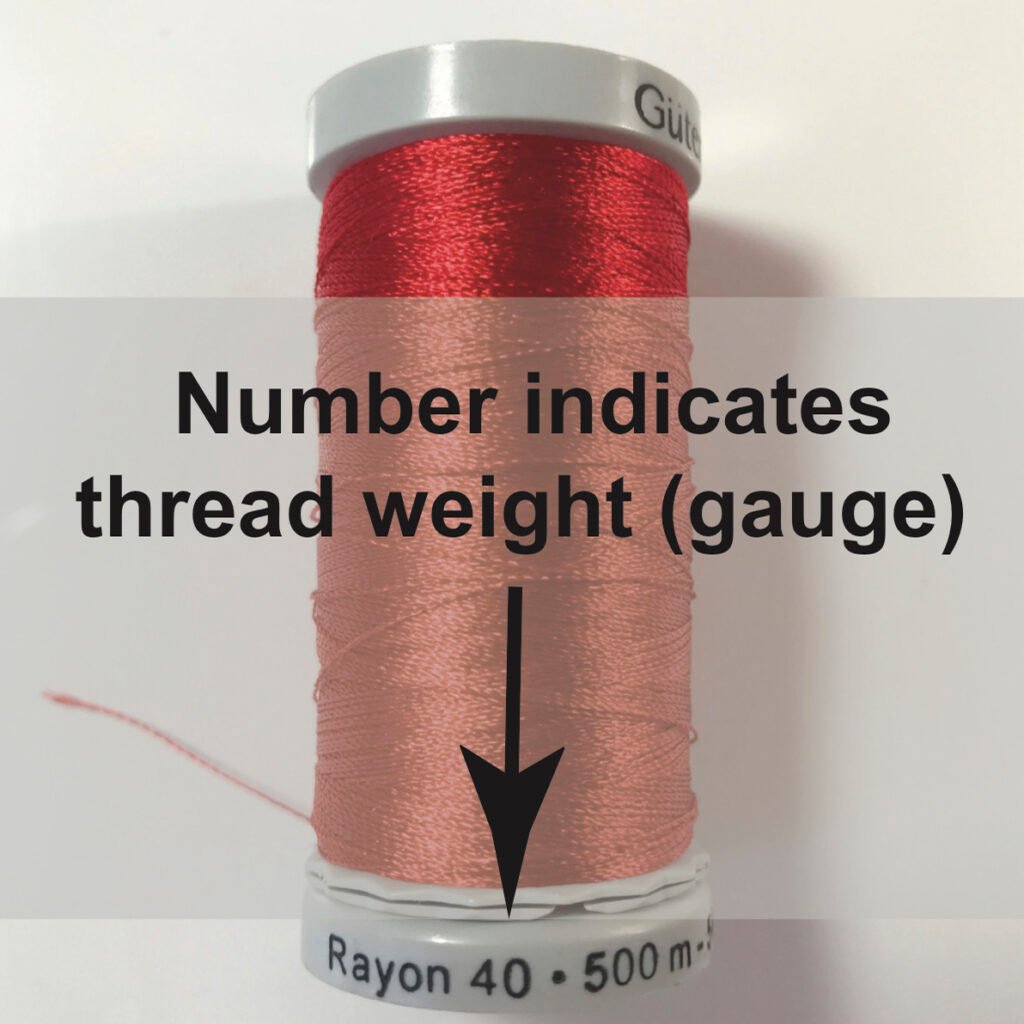
Thread weight variations
Machine embroidery thread commonly comes in three weights: 30, 40, and 60.
- The 40-weight is standard and used in most embroidery designs.
- 30-weight is thicker and suitable for bold, standout text.
- 60-weight is thinner and ideal for small, intricate designs or fine lettering.
Of course, there are many more different thread weights than these three.
- 50-gauge is the most common all-purpose thread for general sewing. There is also a 50-weight cotton thread designed for quilting.
- Top-stitching and hand-stitching threads typically fall into the 12-28 gauge range.
How did this numbering system evolve?
The numbering system for thread weights came about by, unsurprisingly, weighing it!
So, for example, a 60-gauge thread requires 60 kilometres of thread to make 1 kilogram, while a 40-gauge only requires 40 kilometres.
Therefore, the 60-gauge thread is finer than the 40-gauge as more length is needed to make up 1 kilo in weight.
Which Thread Weight is Best for Machine Embroidery?
Most embroidery designs are digitised for 40-weight thread, making it the most versatile and commonly used. This thread is also perfect for most thread painting and thread sketching purposes.
For a more information and guidance about thread painting, my book “Creative Thread Sketching: A beginner’s guide”, is the perfect introduction. It offers everything you need to know to get started!
Variations in Spool Size
Thread comes on spools of different sizes, affecting the quantity of thread.
Most standard spools for domestic sewing machines carry 500 to 600 metres of thread.
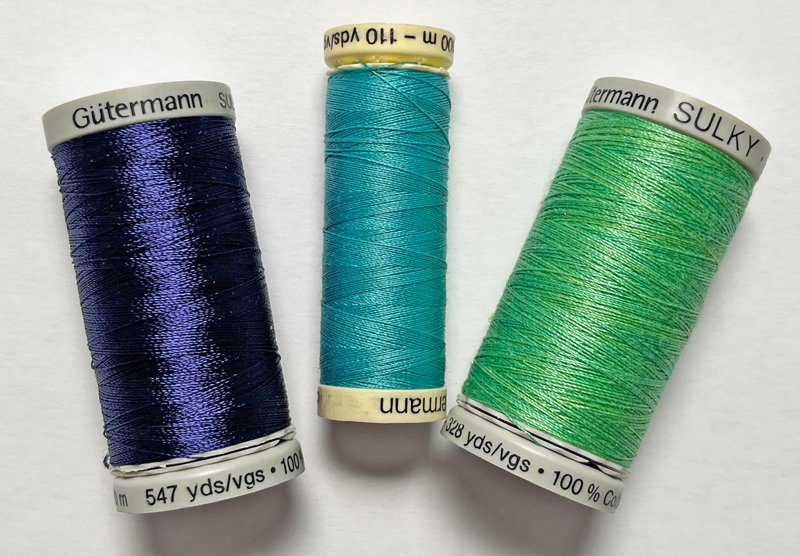
However, larger spools (or cones) holding 2000-5000 metres are economical if you intend to do a lot of machine embroidery or thread painting.
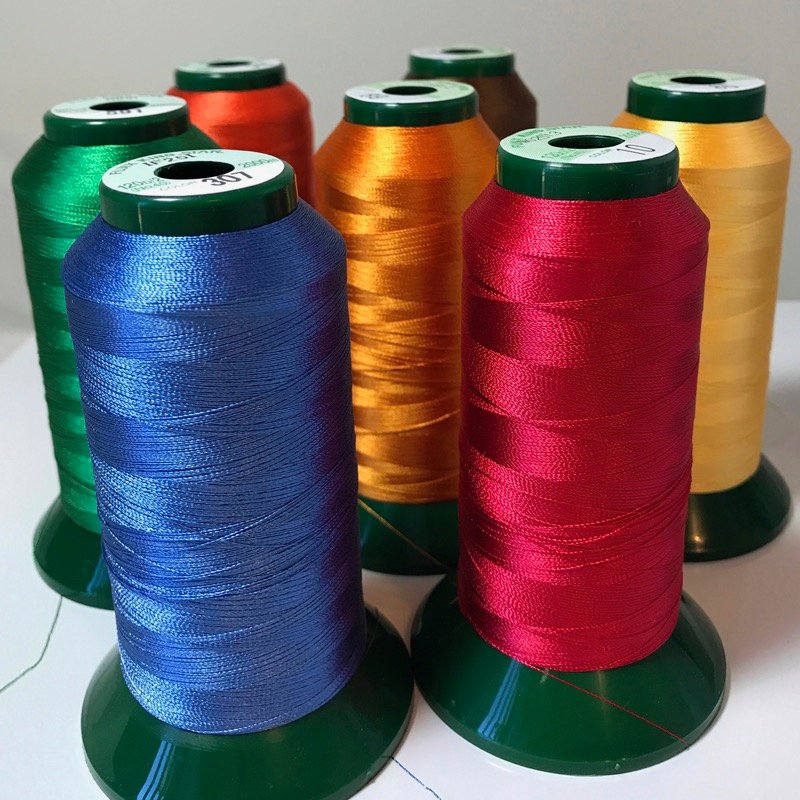
Because large thread cones won’t fit on the spool holder of a domestic sewing machine, spool extensions are available. Some machines — especially those specifically designed for quilting or machine embroidery — can accommodate a spool extension.
Free-standing spool extensions are available in various combinations to use with domestic machines.
Commonly-used Thread Types for Machine Embroidery
Rayon and Polyester Thread
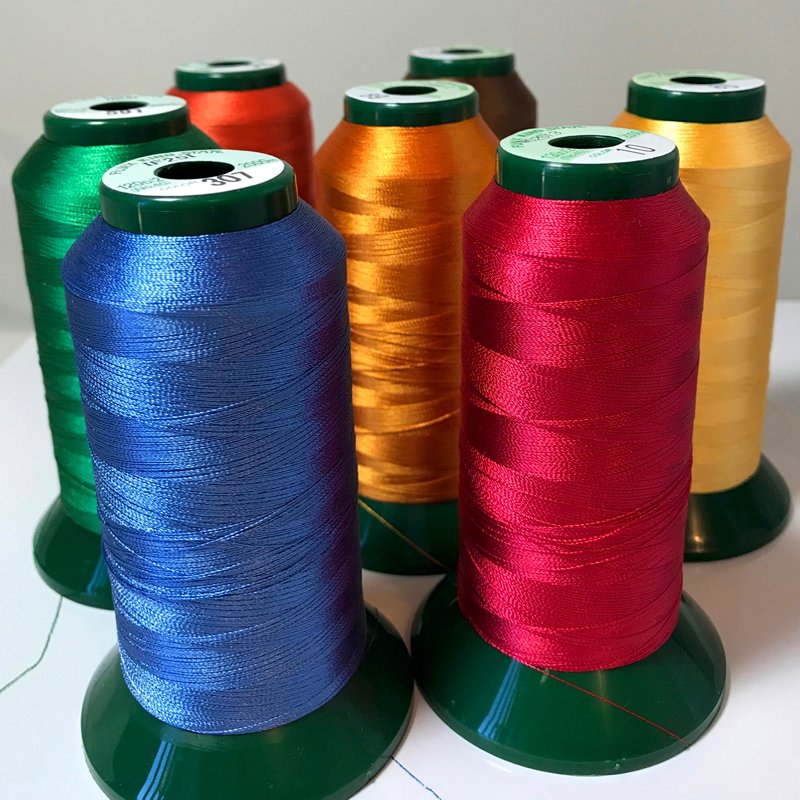
Rayon and polyester are the most common types of machine embroidery threads.
With its beautiful sheen, rayon is popular for decorative and apparel projects.
On the other hand, polyester, known for its strength and colourfastness, is suitable for items that require frequent washing.
Both types are readily available in 40-gauge weight. New Brothread 40-gauge Polyester thread sets are an excellent, hip-pocket friendly machine embroidery brand of thread.
My favourite for ease of stitching, appearance, and cost is Fujix King Star thread. This is a Japanese brand and only readily available in certain regions, such as the UK, USA, and Australia. (There may be others). A limited range is sometimes available on Amazon and eBay.
- Click here to visit the parent company Japanese website.
- Click here to visit the Australian distributor (mail order available).
Cotton Thread
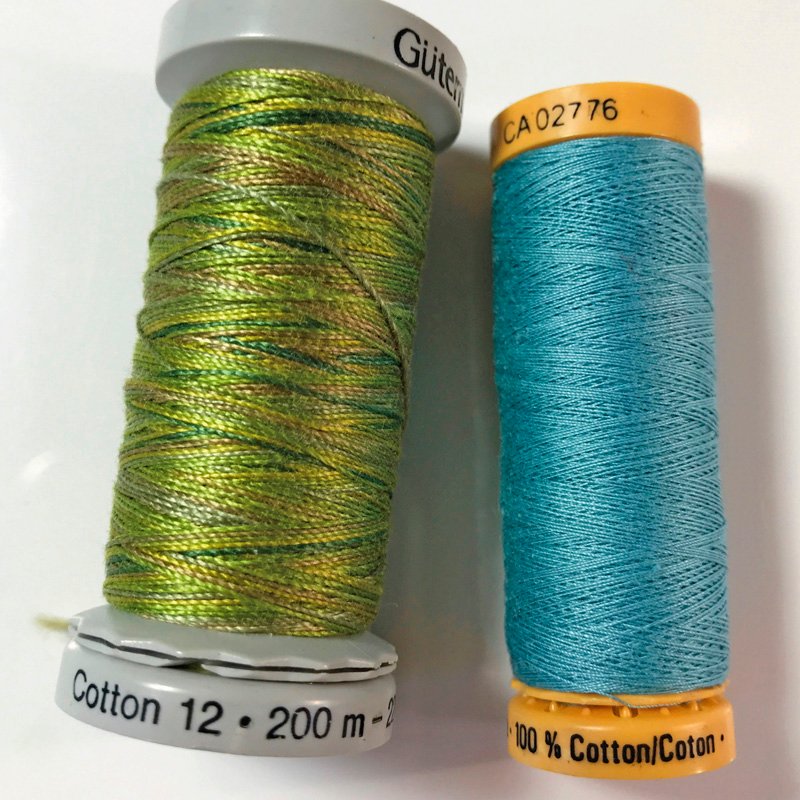
Cotton thread, available in a range of weights, provides a softer, matte look which is ideal if you don’t want a glossy finish. Aurifil and Superior King Tut are both excellent quality threads.
Specialty Threads
Some specialty threads can be more challenging to work with, but there is no doubting their uses for special effects or to add a little glitter or glam to your work.
Silk Thread
Silk thread, valued for its natural sheen and strength, works well with delicate fabrics and luxury items.
While generally more expensive than rayon or polyester, silk is the perfect choice if you want to work with natural fibres. An excellent silk thread is Superior Threads Kimono Silk Thread.
Metallic Thread
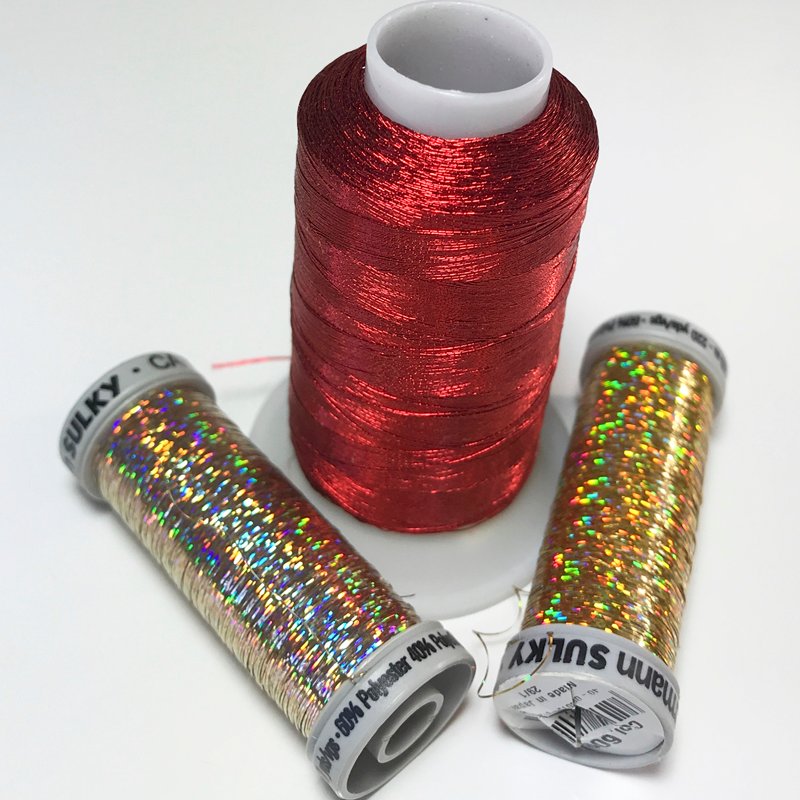
Metallic thread adds a special sparkle to your design. However, it can be more challenging to work with and may require a specialised needle.
Manufactured from metallic foil, it tends to twist and coil as it discharges from the spool and moves through the machine.
Be sure to practice working with this thread before committing it to a project. If the twisting is out of control, try altering the position of your spool, i.e. move it from horizontal to vertical or vice versa.
Most machines can accommodate this change. Try using Brothread Metallic Machine Embroidery Thread, which is relatively easy to work with.
Variegated Thread
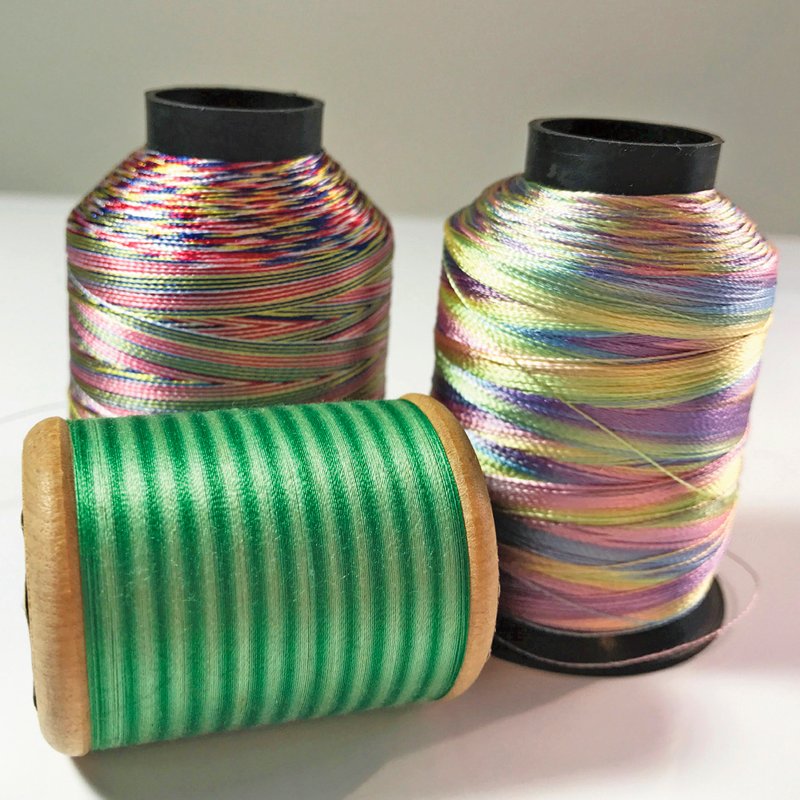
Variegated thread changes colour along its length, providing a unique, multi-toned effect.
You can achieve unusual and stunning effects with variegated thread. Keep in mind that the colour variations are sometimes randomly distributed along the thread. At other times, the colour changes are evenly spaced.
Predicting where the change will occur is tricky, so prepare for exciting results! Simthread has an excellent range of variegated thread available.
Monofilament Thread
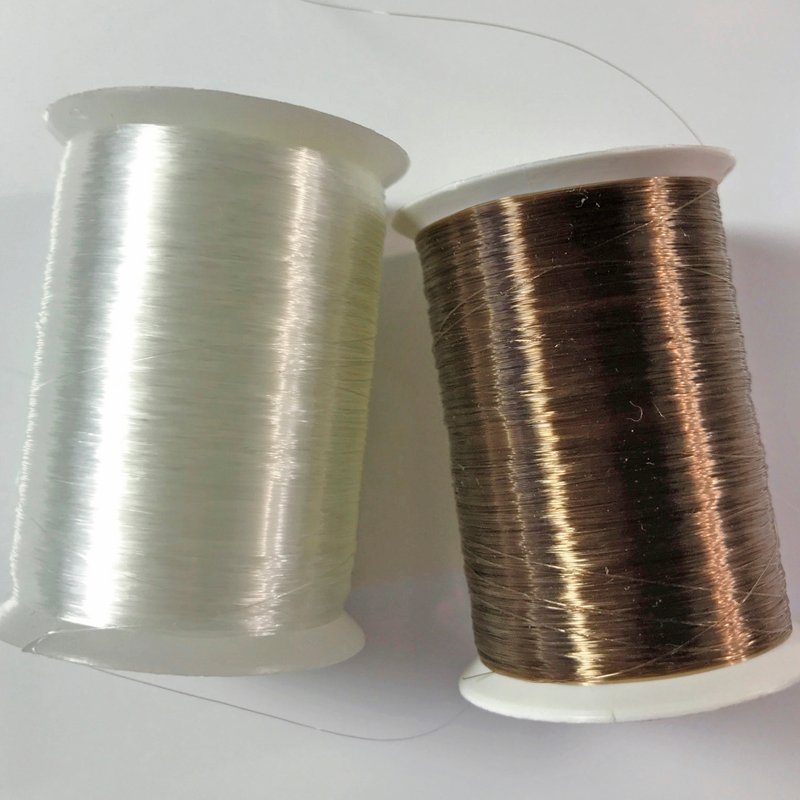
Monofilament thread is translucent or lightly tinted in smoke shades, making it an excellent choice for invisible stitching or appliqué.
Resembling fishing line, it’s not a true machine embroidery thread. However, it has found its way into the hearts of many art quilters.
Monofilament thread is useful for securing the backgrounds of various textile projects, confetti quilts, or when it will later be covered by other stitching.
Recommended monofilament thread:
Popular Brands of Machine Embroidery Thread
Many brands of quality thread are available, all of which offer good value and excellent quality. Aim to choose thread that is strong, resists shredding or breaking, and holds its colour.
Thread is available in all quilting and fabric stores, although some may offer a limited range. You can also purchase thread online. Not all brands are available in all countries, so choose a readily available brand in your region.
Here’s a run-down of popular, high-quality brands of thread:
Fujix King Star
Fujix King Star thread is a high-quality polyester machine embroidery thread used (and loved!) by professionals and hobby sewers alike. It has a gorgeous lustre and comes in 600 colours.
Gütermann
Known for its durability and high tensile strength, Gütermann is a trusted brand in machine embroidery thread. This thread has a beautiful sheen and is resistant to shredding and breaking. It also holds its colour well when repeatedly washed.
Gütermann thread is available on small spools in a wide range of colours, making it a great choice for building an extensive collection.
Isacord
Isacord threads are notable for their consistent quality, extensive colour range, and excellent strength. This thread is easy to stitch with, resistant to shredding and breaking, and will allow you hours of trouble-free stitching.
Machine embroidery uses a lot of thread, so the Isacord 1000m mini-cones are an economical option. The smaller size of these cones allows them to fit on most domestic sewing machines without needing a spool extension. However, be sure to check, as the spools are larger than regular sewing spools.
Sulky
Sulky threads are loved for their vibrant colours and sheen, offering a wide range of weights and thread types. Sulky has an excellent range of colours of 40-gauge rayon machine embroidery threads on 1500-yard spools.
Mettler
Mettler is valued for its high-quality threads, consistent spooling, and range of thread types. This long-standing company offers 40-gauge threads that combine quality and affordability.
Try Mettler Polysheen Polyester Machine Embroidery Thread.
Best Economy Buy
The best economy buys for machine embroidery thread are often found in multi-spool sets from reputable brands.
For example, Brothread Polyester Machine Embroidery Thread. The quality and sheen of this 40-gauge thread (available on 550-yard spools) mixes and matches well with many other polyester thread brands.
Best Quality Buy
Look for well-known, trusted brands like Gütermann or Isacord for top quality. Another favourite of mine is the Japanese thread, Fujix King Star Machine Embroidery Thread. King Star is a high-quality thread at a mid-range price.
Look for well-known, trusted brands like Gütermann or Isacord for top quality.
Another favourite of mine is the Japanese thread, Fujix King Star Machine Embroidery Thread. King Star is a high-quality thread at a mid-range price.
Best Machine Embroidery Thread for Thread Painting
40-gauge rayon thread, with its brilliant sheen, is often the best choice for thread painting, thread painting, and decorative machine embroidery.
Use any of the best quality brands, such as Gütermann, Isacord, Sulky, Mettler, or Fujix King Star.
Bobbin Thread for Machine Embroidery
Bobbin thread is a key player in machine embroidery. It usually comes in weights lighter than the top thread, with 60 and 70-weight being the most common.
The finer gauge makes dedicated bobbin thread perfect for avoiding thread build-up at the back of your embroidery.
It comes in different spool sizes, similar to the top thread. While it’s typically available in white or black, some brands offer a range of colours.
Best Bobbin Thread for Machine Embroidery
Choosing the best bobbin thread often comes down to the project. A good quality 60-weight polyester thread is a reliable choice for general use.
Recommended Bobbin Thread:
- Superior Threads Bottom Line Polyester Thread on 3000-yard cones. This is a lovely, fine, 60-gauge bobbin thread.
- New Brothread Set of 2 Bobbin Thread in black and white. A lightweight 60-gauge thread on 5000 metre spools that is perfect for machine embroidery.
How to Choose the Best Machine Embroidery Thread: Building a collection
Mastering machine embroidery involves understanding and selecting the right thread. With a vast array of weights, types, and brands available, the right knowledge can elevate your embroidery work, creating durable and beautiful designs.
Over time, you will get to know your favourite brands and types of thread. Keep in mind these top tips for choosing machine embroidery thread:
- Quality pays off, so buy the best you can afford. Using cheap or old thread often results in stitching problems, shredding and breakage.
- As you build your thread collection, you’ll likely buy various brands. For most of your embroidery work, try to collect threads that are compatible with the others in weight, sheen, and general appearance.
- Always remember to use an appropriate needle type and size. Make sure it is not dulled from over-use, nicked, or bent.
Armed with the insights from this guide, you are well on your way to achieving stunning results with your machine embroidery projects.
